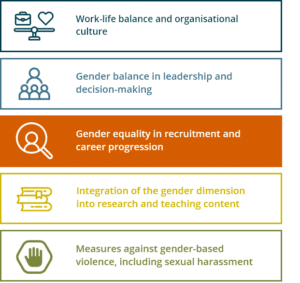Nehem is an important service provider in the field of Diversity, Equity and Inclusion (DEI). Our DEI experts are committed to contribute to SDG 5, and have the knowledge and tools to support organizations in the creation of a gender equal work environment where talent can thrive.
Gender equality is a broad and multi-faceted concept. The European Commission recommends a division into five thematic areas for gender equality in research & innovation. In a series of five articles, we will introduce you to these thematic areas, which we like to call Key Areas of Intervention (KAIs). This article will focus on KAI 3: ‘Gender equality in recruitment and career progression’.

“Everyone is different and unless employers take diversity seriously they will fail to recruit, retain and engage the commitment of the talent needed to sustain and improve performance”
(Chartered Institute for Personnel and Development, 2021).
Support measures within recruitment, selection and career progression aim to ensure that women and men get equal chances to develop and advance their careers. Critically reviewing existing processes and remedying gender biases are important steps for ensuring gender equality in careers. Gender biases are pervasive at work and influence both conscious and unconscious decision-making, affecting for example the language used in job advertisements, evaluation of job applicants, job interviews and salary negotiations. Biases affect our definitions of excellence, what makes a successful career and who is considered a good leader. Accordingly, excellence can be associated with employees dedicating all their time to work. Part-time work or career interruptions, in the case of parental leave, do therefore not fit this image.
Institutional gender biases impede women’s career advancement and confront them with the ‘glass ceiling’. Marylin Loden introduced the term ‘glass ceiling’ during a speech in 1978 referring to “the unseen, yet unbreachable barrier that keeps minorities and women from rising to the upper rungs of the corporate ladder, regardless of their qualifications or achievements.” (Federal Glass Ceiling Commission, 2014). In this framework, gender discrimination increases as one moves up in the hierarchy, meaning that junior employees face less discrimination based on their gender compared to senior employees.
Therefore, measures are needed to avoid gender discrimination along career paths. Successful measures include:
- Critically review the procedures for recruitment, promotion, training & development to determine whether these procedures (unconsciously) discriminate by gender. Implement formal measures to address and prevent bias, discrimination, and stereotypes. Examples include awareness training, checklist criteria, blind assessments, gender parity in committees and objective recruitment & selection measures like standardized interview scripts and questionnaires.
- Use gender-neutral advertisements. Gendered language and imagery in job advertisements influence potential applicants. Advertisements should be free of any stereotypes.
- Provide unconscious bias training for recruitment and promotion committees. Biases affect which candidates are invited for job interviews, which candidates get selected and how salaries are negotiated. These training sessions should not only focus on increasing awareness, but also on implementing the efforts into recruitment and selection measures and decision-making in committees.
- Establish regular and consistent monitoring and evaluation processes. This is crucial to stay updated on the progress made. Monitoring processes may for example include regular measurements of the gender pay gap to adjust plans accordingly.
Gender equality in recruitment and career progression at all levels of the organisation promotes diversity of thought and increases innovation, a better understanding of the customer base, and financial outcomes.
Chartered Institute for Personnel and Development (2021). Inclusive recruitment: Guide for employers.
Federal Glass Ceiling Commission (2014). Solid investments: Making full use of the nation’s human capital.
Read more about Diversity, Equity and Inclusion
Marie Curie Acties ondersteunen toponderzoekers
De Marie Skłodowska-Curie Actions (MSCA) zijn toonaangevend voor de ontwikkeling van academisch toptalent en de bevordering van onderzoek. Het programma is hét EU-programma voor doctoraalonderwijs en postdoctorale training. In dit artikel gaan we in op de...
Download the Horizon Europe magazine and create a funding strategy with impact
15-05-2022The PNO Group, of which Nehem is a part, has created an online magazine about the Horizon Europe programme. The magazine offers a detailed overview of all programme components, as well as practical looks at topics as gender equality, impact and how to...
Slim werken aan een sterke leer- en ontwikkelcultuur
Een veranderende arbeidsmarkt De arbeidsmarkt is aan het veranderen: individuele behoeften worden belangrijker, digitalisering en robotisering rukken op, de vergrijzing schrijdt voort. Dit heeft gevolgen voor de kennis, vaardigheden en organisatiecultuur die een...


